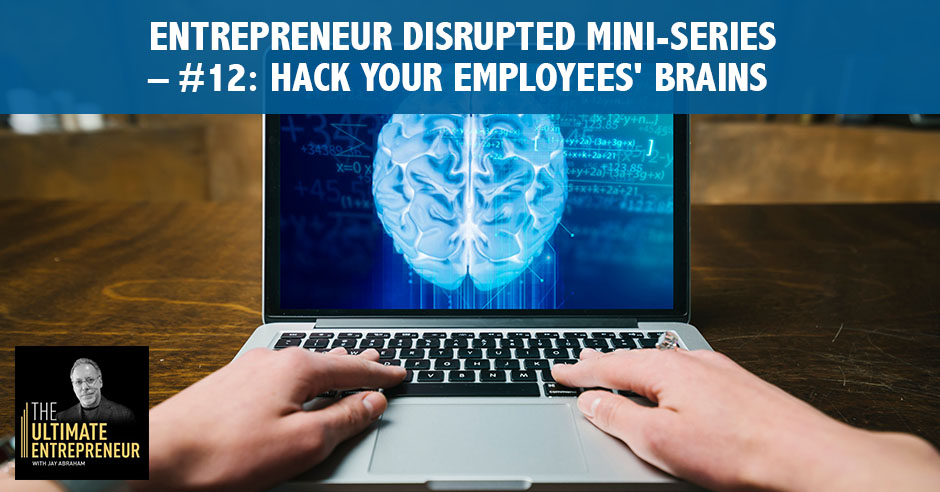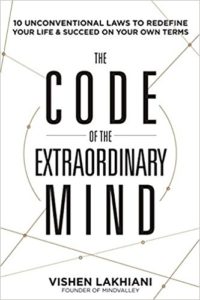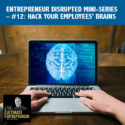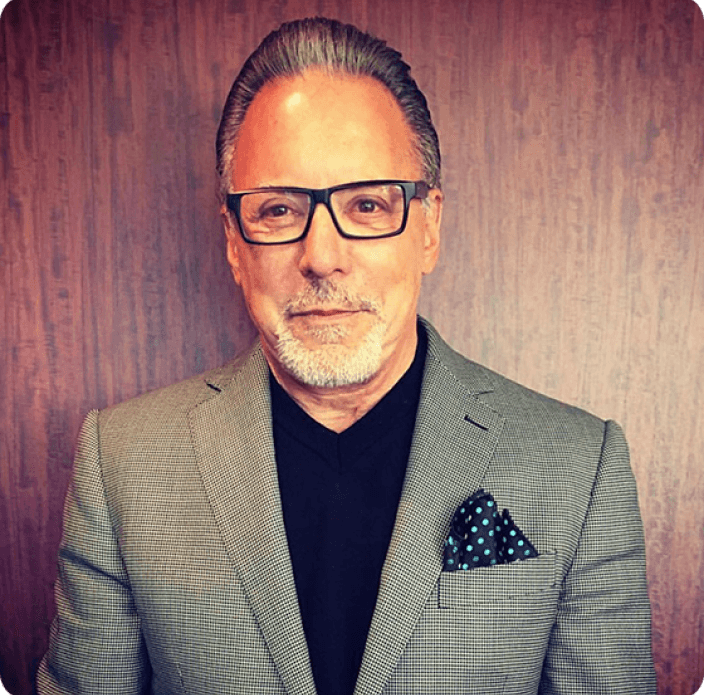
“Is it ethical to hack your employees’ brains?” In #12 of the Entrepreneur Disrupted Mini-Series, Dave Asprey and Jay Abraham discuss the ethical implications of enhancing your employee’s performance using one of Dave’s biggest areas of expertise: bio-hacking. Learn everything about the food, tools, and technologies used for boosting cognitive function and understanding and extracting the fullest potential of your brain and those of your employees – PLUS more wildly eccentric disruptive concepts that Dave swears by. Google, Facebook, Twitter, and a whole host of other Silicon Valley companies are now offering carefully-curated food to their employees because they figured this out. Feed good food to employees, and they’ll be happier and more willing to work better. Bio-hacking is something that can potentially improve and enhance business and employee performance. Question is: are you ready for its repercussions?
Listen to the podcast here:
Listen to “Show 99 – Entrepreneur Disrupted w/ Dave Asprey – #12: Hack Your Employees’ Brains” on Spreaker.
Entrepreneur Disrupted Mini-Series – #12: Hack Your Employees’ Brains
We’ve got an unconventional episode for you. Is it ethical to hack your own employees’ brains? Dave and I go headfirst into what is one of Dave’s biggest areas of expertise, bio-hacking. We cover everything from feeding employees to enhance their performance, tools and technologies for boosting cognitive function, understanding and bringing out the fullest potential of your brain and theirs, and more wildly eccentric disruptive concepts that Dave swears works. It’ll certainly be a fresh slant on something you’ve never thought about before.
This is all about you. It’s all about how you disrupt your business, how you disrupt your industry and probably your brain while being an entrepreneur or working for one perhaps, along with our co-host, Jay Abraham. Jay is a total marketing bad-ass and has taught me a lot of things and he is one of the good ones. We’re going to talk about, “Is it ethical to hack your employees’ brains?” This is a slippery slope where we talk about how ethical is it to be involved in your employees’ lives? One of the most intimate things you can do to affect someone’s biology is actually feeding them. Not a lot of people know this, but Harvey Kellogg and Graham, the guy who did Graham crackers, created those foods, Kellogg’s Raisin Bran, corn flakes, ect., to lower sexual desire in males because that’s the root of all evil. This is a true story and I’ve talked about this over on Bulletproof Radio a number of times. They made foods that lower testosterone because if guys are weaker and have less testosterone, then there’s less sex and therefore, we will all be better people. You could argue with this biology quite a bit, but that’s how intimate food is with how you perform. Google, Facebook, Twitter, and a whole host of other Silicon Valley companies are now offering food to their employees because they figured this out: feed good food to employees, and they’ll be happier and work better. However, it’s a very intimate act to take control of what your employees are going to put in their mouths. It also is very efficient: they don’t have to leave the office; they don’t have to pack lunch. it’s a great time saver.
We bring lunch in when we have meetings at our office, although so many people work from home that you can’t really order pizza for everyone on the days when we’re having an all-hands meeting [icon name=”window-minimize” class=”” unprefixed_class=””] — If you did, it wouldn’t be good for them. One of the things I decided to do is I want to work with people who don’t have voices in their heads screaming. I want to be able to say, “That didn’t work,” to someone and I want the person to go, “You’re right. That didn’t work even though I was doing it.” What most people hear me say, “That didn’t work,” they hear, “You’re a bad person. You’ve been a bad boy, Johnny. No one loves you. No one’s going to feed you. You’re going to die.” This isn’t a rational voice in the head. This is a psychological voice in the head. It’s a survival thing. It’s meat programming that’s there to support primordial parts of our bodies that have nothing to do with business or being an adult. However, that response is annoying because as CEO, I want to be honest with myself and I want to be honest with my people without being a jerk. I’m not talking about building the Microsoft yell-at-each-other culture that they had a while back where it had gone too far. We’re willing to face facts instead of, “We’re willing to face facts and call each other a jerk.” That stresses some people out. Although I hear that they’ve pulled back on that and it’s much better at Microsoft now. Gordon Moore at Intel had the same thing where there’s a little bit of aggressiveness.
I want to be able to have upfront conversations without pushing on people’s egos. I don’t want defensiveness. I want action and acceptance of new ideas. One of the fastest things that I know of, and I know this because I do it with executive coaching clients, is heart rate variability training. This is a little device that we have on the Bulletproof website. It clips to your ear and it trains you to change the spacing of your heartbeat, which takes you out of fight or flight mode and back into consciousness mode where you can use your brain to make decisions instead of your emotions. I asked the Executive Team to do that before we get on our executive call just for five minutes, so they can be less reactive and more proactive. That is directly hacking their biology. I went a step further. My high-end executive clients do a program called 40 years of Zen, which is one where we glue electrodes to your head for about a week and we teach you with incentives to get control of the voice in your head of what your brain can do and the results are transformative. This is a $15,000 program and there’s a huge waiting list to get in and I’ve done it ten times. I have a few clients who have done it five or six times with increasing levels of difficulty. Ten weeks of my life spent with this.
There’s a difficulty factor that can be raised and raised?
Yes, it gets harder and harder as you do it. My brainwave amplitude is four times higher than it used to be. I’ve literally improved what my brain can do. This is one of the reasons that I am the entrepreneur and the human being I am today because I got out of my own way by having a lie detector stuck to my head. Every time I lied to myself, my score went down, so I had to realize the many, many ways I was deceiving myself. I send my direct reports to this program. It’s expensive, but the difference is that now, we’re on an equivalent footing where I can say something and if I get a response that’s completely not right, I can say, “Where’s that coming from? Is that your ego?” They’ve had a lie detector on their head, they know when it’s their ego. They might not like hearing it, but they can tell me the same thing. We have a common experience here, which comes from having a lie detector stuck to our heads, but literally, I am hacking the brains of my direct reports. This is a big perk. I’ve had some people say things like, “I might not like what I find in there. No way,” and they dig in their heels and won’t do it. I’m like, “You don’t have to do it, but you might not be a cultural fit” because everyone else here has a common experience. It’s not a requirement, but it’s one of the biggest possible perks I know how to give.

It’s the single biggest thing that’s changed my performance I’ve ever done other than potentially getting crap out of my diet. If you’re fat and foggy all the time, you’re not going to hack your brain and you’re going to be reactive in meetings anyway. That’s what I do to the point that I’m now hiring a neuroscientist, so we’ll have a full-time neuroscientist on staff. We’re not a big company. We’re a small company. Paying someone to do neurofeedback on everyone in the company as much and as many as I can, as often as I can is unprecedented. I don’t know anyone who does this and has someone who’s part of the team whose practice is neuroscience for human performance, but my company is all about human performance.
I believe it’s not only ethical to help your employees grow and to help your employees control their own biology, but it’s a performance benefit for the company, so I’m fulfilling my responsibility to the people who have graced me with their presence to join me on my mission. How can I not do this if this is something that powerful that’s within reach? That’s my perspective on it though, but I expect that there are probably a few people going, “Did I just hear that right? Dave’s hooking electrodes up to the brains of people who work for him to change their brains?” Yeah, you heard that right. I’m hacking my employees’ brains and they’re happier. It makes them better people, first of all. The people who’ve been through the training are like, “I didn’t realize I was doing that. Now I can see what I was doing and now I can change my behavior.” They’re more in control of their brains and their bodies than they were before.
That is a bad-ass perk and the kind of people who hear that and say, “I have to come work for Bulletproof,” those are my people. The kind of people who hear that and say, “That scares the crap out of me,” you should go work for some other knock-off coffee company. You won’t fit in here because this is a place where people fearlessly address their crap, whatever it is. I’ll help them by giving them the best food. I’ll help them by giving them tools like heart rate variability training and I’ll help them by plugging their brains into computers and showing them what’s really going on in there. That is a level of perk that I don’t think you can put a value on, but it’s priceless. What do you think? Crazy pants?
No, I actually think it’s quite profound, but let me make a couple points that I doubt you’ll even underscore. You’ve got a waiting list to do this with people who will write a check for you and you allow your team to have access preemptively?
I will. You have to apply. There’s a waiting list because there are some people, “Sorry, you don’t get in. It’s not right for you.” There’s a waiting list and I set aside that revenue for my people to go.
They’re being paid for the privilege of experiencing this, right?
They’re paid for the whole week that they get off, which isn’t a vacation, and they’re not working at all.
Do they stay there?
Yes.
They stay there, but you have a center or a compound you’ve created? If they’re not doing it, you’re not forcing them at gunpoint or are you?
They’re not forced. If someone says they don’t want to do it, it’s fine. They do not have to do anything they don’t want to do.
You and I are dissimilarly the same. I do everything imaginable to try but not as scientific to try to expand, understand and liberate all the capacity for not just performance, but for perspective. Performance alone isn’t available without perspective.
You can perform without perspective. One of the easiest ways to get someone to perform is to put the fear of God into them like, “There’s a tiger chasing you. Are you going to run your best time?” Yes, you will, but you will not like it, and you won’t like how you feel when you’re done. That’s how I ran my career and I made $6 million. It was because I was afraid of failing and I did all sorts of stupid crap and I’d beat myself up. It was bad, but it was still nice to make $6 million.
It’s important for you to put a couple other pieces of nuance context in. You were talking about your clientele and you said what really fascinated you most was the stature of high performers who were drawn to your business, products, ideology, philosophy, and methodology. These are people who inherently recognize beyond a shadow of a doubt what being able to think differently, deeply, wider, more rationally, not necessarily emotionless but strategically emotional is worth. I don’t think a lot of people realize how much more is possible and how much of our brain capacity we use, number one.
Number two is we have the ability to leverage geometric growth in our being, in our worldview. I don’t think people who have allowed themselves to not experience that can fathom how rich and how powerful, and not just wonderful, but how different it is when you’re in control of your life instead of your life controlling you. I’m not answering other than to say I think for anyone who grasps it, it’s the ultimate perk. If anyone has observed it in your organization through others and seen profound differences, the only fear that they would have is the fear of seeing sides of them, truths within them, or their inner demons that truthfully, you’re trying to help them either vanquish or neutralize. They’re afraid of themselves more than they afraid of it. Wouldn’t you think?
Most people are unaware that that’s going on, and most entrepreneurs are unaware of that. When I work one-on-one, people are like, “What’s this behavior that’s going on here?” There’re various ways to address behavioral things, but there’s always underlying some sort of unconscious thing. I like to use Vishen Lakhiani’s word from his book, The Code of the Extraordinary Mind, which is a book that I recommend for entrepreneurs. It’s a good book. Vishen has this word called brule. Brule is directly out of his book, a bullshit rule. This is a rule that got installed in you oftentimes when you were a kid, oftentimes by society, and it’s something that you believe and act and operate unconsciously. When you can identify a brule then you can stomp on it and say, “That wasn’t a rule that I put in place and it wasn’t a rule that is serving me, so I’m going to stop believing that.”

The problem with brules is that many of them are unconsciously acted on. “I’m going to die if no one likes me” is a very common one. That’s good because when you’re four years old, that’s true because you can’t take care of yourself, so it served a function. Now people don’t have to like you. If you’re in a position like I am where you’re in public, you’re going to get haters. I love the commercially motivated haters where they’re trying to sell something else and say, “Dave Asprey is a bad man.” I can either respond like, “I’m going to die because someone doesn’t like me or I can get rid of that brule and I can be like, “It’s amazing what some people will say.” I can take it whichever way; I don’t care but I got rid of that brule and it doesn’t bother me.
I want to teach my employees and everyone else in my life. I hack my kids’ brains too and everyone. I don’t say, “I do it.” No, I provide the tools and you hack your own brain, that’s how it works, but I am providing tools that cost tens of thousands of dollars to them for free so they have the opportunity to hack their own brains. What you end up doing is you end up shining the spotlight on your own brules and understanding, “I didn’t know that was happening. I’m probably embarrassed that I was doing that because I wasn’t aware of it,” but once you have visibility, you can have control. Most people don’t have visibility because brules are designed to be invisible for our survival. You got to get past the invisibility cloak. When you do that, you get your superpowers.
I’ve been blessed because I have supported, helped, advised, and been benefactor to a preponderance of people who are focused on how many ways could they liberate the mind to be much more powerful, much more purposeful, much more productive, much more profitable, much more passionate, and not just like a dog rubbing another dog’s foot, but I mean real passion, purpose, and possibility. You’ve seen it, you’re dedicated to it. The proof positive of the why, if we go back to that Simon Sinek, is that the people who already had, not just the beginnings of it, but the inherent understanding of how much more was possible are some of the most loyal and passionate clients that you have, aren’t they?
It’s totally true. One thing that happens when you get control, or you see your brules, you might be in the wrong job. If you’re working for me and you’re in the wrong job and you realize it because I helped you with some technology that showed you what was going on, go find the right job. Get out of here respectfully, with a pat on the back, and we’re still friends, but I don’t want you here if this isn’t your mission and it’s okay.
That is for a duality of purpose. One, as an integral part of the fabric of your purpose and company, you don’t, but you also don’t want it for them because, no matter how long we’re going to live, our lives are a long time to live if we’re unhappy, a long time to live if we’re unfulfilled, a long time to live if we don’t know why, but if we’re miserable or ambivalent or apathetic or angry and it’s such a travesty to see so much emotional energy being dissipated by all the holes in our psyche. You’re the liberator. You’re coming in and you’re liberating people from the yoke of invisible constraint that has contained and maintained them in a bubble. They are bubble boys and girls, but they don’t know it.
That’s part of the mission that I have for Bulletproof, with society, is to help people figure it out. I turned that around and I started it for the companies that I ran. Bulletproof isn’t the only company I’m involved with. I’m an advisor to other companies. Homebiotic is another company that Bulletproof sells its stuff, but it has its own DNA and it’s its own company. I want to take the tools and the stuff that either isn’t accessible or is too cutting edge to where it’s just not out there. I’d like to make my 40 years of Zen program far more affordable. It’s got hundreds of thousands of dollars of tech and dedicated staff and it’s hard to do. That’s what it is now and it’s evolving. I’ll continue to evolve that, but that’s not my core thing. That has helped me a lot, so I want to turn it around and use it to help people, but because I have that special ability, because I’ve studied it for a long time, I’m going to take that and I’m going to apply it towards the employees who are supporting the mission.
Entrepreneurs who don’t have that, I guarantee you that you can go pick up heart rate variability. You could talk to maybe Emily Fletcher who’s been on the Bulletproof Radio show. She has a really nice meditation course called Ziva Meditation and she spoke at the Bulletproof Conference. You can send people to a Tony Robbins seminar or anything like that. If you invest in the personal development of your team, and I don’t mean gym membership, which is such a lame perk, but it’s better than nothing, but seriously, you can do better. Bring a yoga teacher in and do it there instead of sending people out, and teaching meditation. Whatever is at your level that your employees will accept, push their limits a little bit. You owe it to the people who are supporting your company to help them on that front. If you give them a nice lunch and a paycheck and they go home and they’re unhappy and stuck, your company will take on the unhappy and stuck energy. I don’t want people who are stuck and unhappy at Bulletproof unless they’re willing to get unstuck and make themselves happy. If you’ll do the work, come work for me. If you don’t do the work, go work for someone else, it’s okay.
There’s a very old adage, but it’s quite profound. Mutual self-interest is the greatest motivator there is, but a lot of people don’t really know what their interests are. If you can help them understand that, “I want to liberate your energy, your focus and all that will flow from it.” If having the brain hacked in a $15,000 environment is a little too intimidating, all they have to do is get anything qualitative that everyone embraces with totality and watch what happens. The greatest thing about all these soft things are that you can see very quantifiable, very tangible results, and they tell the story.

This has been a pretty interesting episode for me of Entrepreneur Disrupted. I haven’t really disclosed publicly that I’m doing this with my team, but it’s about time. I’m willing to talk about this. It’s highly controversial. I also give people Nootropics, a cognitive enhancing substance. The one that most employees are on is called Unfair Advantage. It’s a Bulletproof product. Many of them are taking the other ones I recommend. I can’t legally buy those for my employees but things like Aniracetam, I would guess that probably three-quarters of the Bulletproof team is on that smart drug, which I’m on. It’s in an unusual regulatory status, which is why I can’t give it to them; otherwise, I would. It’s not illegal, it’s just not approved. This is how high-performance companies are going to be high performance. If I’m wrong, then I’m wrong, but I wouldn’t bet on it.
When Tony Robbins and I were working closely together, everybody was walking on fire. I stood for how much easier it was to accomplish so much more from time effort, so I was going to become the person that let everybody walk on Jell-O with the motto, “It’s not so hard.”
Maybe that’s why we’re friends. I was onstage with a former Navy SEAL, Kirk Parsley, and I’m like, “I don’t believe in struggle.” I believe in working hard but when you work so hard and you face a problem, you don’t know how to fix it, you can either flop around and struggle or you can resign and say, “It’s really hard.” Being able to approach a challenge with a sense of ease even if you don’t succeed in the challenge, that’s different than the struggle. It reminded me that I’d rather walk on Jell-Os and fire. Thanks, Jay.
Thank you, Dave.
Important Links:
- The Code of the Extraordinary Mind
- Simon Sinek
- Homebiotic
- Ziva Meditation
- Tony Robbins
- Nootropics
- Unfair Advantage
- Aniracetam
- Kirk Parsley









